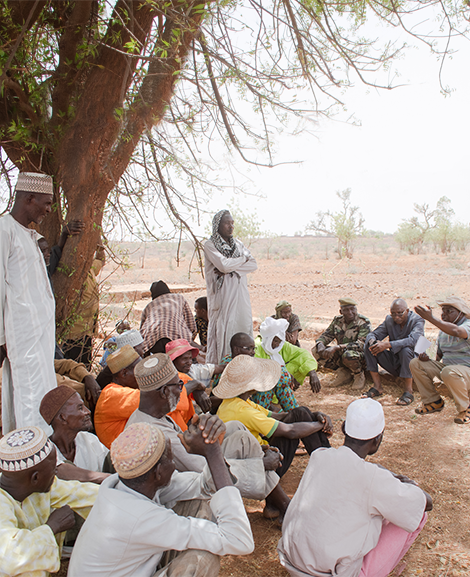Why are we running the project?
Roughly two thirds of Africa’s land is affected by degradation – with devastating effects for our climate, biodiversity, food security and livelihoods of rural communities dependent on this land. Restoring this land presents a unique opportunity to not only mitigate climate change, but also
- boost agricultural yields and enhance food security,
- reverse biodiversity loss,
- enhance water access and quality,
- and create jobs for resilient livelihoods.
Restoring degraded agricultural land for instance by regrowing trees can build soil health and increase agricultural yields, while also drawing down carbon from the atmosphere and fixing it in soils, roots and trees. The integration of a diverse mix of tree species can provide additional income to farmers from products such as fruits, firewood and nuts.
While current political commitments for restoration at regional and national levels create momentum, realizing tangible impacts for our climate requires accelerated action at local level to implement these promises in ways that serve both people and the planet.
Our goals
The project aims to accelerate local implementation of equitable and multifunctional restoration activities in two key landscapes of the AFR100 Initiative.
Multifunctional restoration calls for a coherent integration of policies, practices and actors in a landscape, across food, water and forest sectors, that delivers a wide range of ecosystems services for people and planet. To achieve this, landowners and users, local restoration champions and local governments require spaces to openly exchange on knowledge, skills and visions, consult each other and coordinate in order to drive collective action towards restoration.
Bringing in the voices, interests and needs of vulnerable groups is an effective way to challenge marginalization. Evidence shows that it can significantly enhance the long-term viability and sustainability of landscape restoration initiatives.
How does the project work?
With our support, WRI will bring together landscape actors at the local levels in both Makueni (Kenya) and Illéla (Niger), enabling them to set shared agendas, define support needs, attract finance, coordinate implementation, share lessons, and track progress. The inclusion of youth, women, and indigenous peoples aims at shifting the focus from how many hectares are to be restored to who is involved and heard, what the expected outcomes should be and how those outcomes will impact different segments of society in terms of benefits and costs.
In addition, WRI will engage local policymakers in a peer learning and mentoring program over the course of half a year, encouraging them to identify policy barriers and develop a menu of short-paced solutions that can foster the implementation of equitable restoration solutions.


